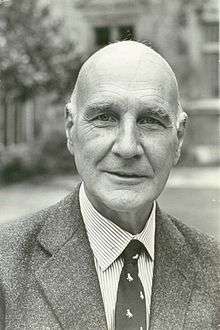John Norman Davidson Kelly

John Norman Davidson Kelly FBA (1909–1997) was a prominent academic within the theological faculty of Oxford University and Principal of St Edmund Hall, Oxford between 1951 and 1979 during which the Hall transformed into an independent constituent college of the University and later a co-educational establishment.
Early life
John Kelly was born in Bridge of Allan, Perthshire on 13 April 1909 and was the fourth of five children to his Scottish schoolmaster father and English mother. John was home-schooled by his father and graduated initially at the University of Glasgow after which he went up to Queen's College, Oxford having secured a scholarship. At Queen's he read classical moderations, Greats, and theology and graduated with first-class honours. Despite an upbringing as a Presbyterian he was confirmed into the Church of England and entered the ministry, attending St Stephen's House, Oxford before being made deacon in Northamptonshire.[1]
St Edmund Hall
Before completing his diaconal year he was invited to return to Oxford as chaplain and tutor in theology and philosophy at St Edmund Hall by the then principal, A.B. Emden beginning a sixty-two-year association with the Hall. He was ordained priest in 1935.[2] In 1937, Kelly was made Vice-Principal. During World War II, he wished to become a military chaplain but Emden would not release him, and he instead undertook linguistic work for the Foreign Office. Emden was forced to retire in 1951 because of illness and Kelly became Principal, a position he held until 1979.

Kelly became Principal of the Hall at an important phase of its 700-year history, namely its independence from Queen's College, of which it had been part since 1557.[3] The process, started by Emden in 1937, was brought to fruition in 1958 when Kelly secured the co-operation of Queen's and obtained for the Hall a Charter of Incorporation, presented by the Duke of Edinburgh.
During his tenure as Principal, Kelly oversaw a major fund-raising programme which allowed the building of new student accommodation and dining facilities. A period of illness in 1966 cut short his tenure as vice-chancellor of the University. Between 1972 and 1977 he was pro-vice-chancellor of the University.[2] Finally, before he retired as principal, he oversaw the admission of women into the undergraduate body of the Hall, with their first matriculation in 1979.
Academic achievements
John Kelly was prominent in the theology faculty throughout his association with St Edmund Hall. He was speaker's lecturer in biblical studies from 1945 to 1948 and subsequently held a university lectureship in patristic studies until 1976. He published widely, writing on the development of the early Christian Creeds and doctrines, his Early Christian Creeds and Early Christian Doctrines becoming standard secondary works and seminary textbooks; commentaries on the pastoral epistles; biographical studies, including studies of St Jerome and St John Chrysostom; and The Oxford Dictionary of Popes.[4] He was working on a companion volume to the Oxford Dictionary about archbishops when he died.[2]
In the ecclesiastical world, he became a canon of Chichester Cathedral in 1948, a position he held until 1993. He presided over the Archbishop of Canterbury's Commission on Roman Catholic Relations from 1963 until 1968 and accompanied the archbishop, Michael Ramsey on his historic visit to Rome in 1966. He was a founder member of the Academic Council of the Institute for Advanced Theological Studies in Jerusalem.[2]
He was awarded the degree of Doctor of Divinity in 1951 and fellowship of the British Academy in 1965. He died a bachelor on 31 March 1997 and his cremated remains are interred in the antechapel of St Edmund Hall.[1]
Notes
Selected bibliography
- Kelly, J.N.D. [1950] (2006) Early Christian creeds, 3rd ed., London : Continuum, ISBN 0-8264-9216-9
- Kelly, J.N.D. (1952) What is Catholicism?, Saffron Walden, Essex : Talbot Press (S.P.C.K.), 39 p.
- Kelly, J.N.D. [1958] (2000) Early Christian doctrines, 5th rev. ed., London : Continuum, ISBN 0-8264-5252-3
- Kelly, J.N.D. [1963] (1987) A Commentary on the Pastoral Epistles. I Timothy, II Timothy, Titus, Black's New Testament Commentaries, London : Addison-Wesley, ISBN 0-06-064329-3
- Kelly, J.N.D. (1964) The Athanasian Creed, Paddock lectures ; 1962–1963, London : A. & C. Black, 140 p.
- Kelly, J.N.D. (1969) A commentary on the Epistles of Peter and of Jude, Black's New Testament commentaries, London: Black, ISBN 0-7136-1010-7
- Kelly, J.N.D. [1970] (1985) Aspects of the Passion, The Archbishop of Canterbury's Lent book, Mowbray's Christian studies series, London : Mowbray, ISBN 0-264-67035-3
- Kelly, J.N.D. [1975] (1998) Jerome : his life, writings and controversies, London : Duckworth, ISBN 0-7156-1231-X
- Kelly, J.N.D. [1986] (2006) Oxford Dictionary of Popes, Updated Ed. with new material by M. Walsh, Oxford University Press, ISBN 0-19-861433-0
- Kelly, J.N.D. (1989) St. Edmund Hall: Almost Seven Hundred Years, Oxford University Press, ISBN 0-19-951559-X
- Kelly, J.N.D. (1995) Golden Mouth : the story of John Chrysostom – ascetic, preacher, bishop, London : Duckworth, ISBN 0-7156-2643-4
References
- Cowdrey, H.E.J. (1988) "St Edmund Hall, Queen's Lane", In: Hibbert, C. (Ed.) The encyclopædia of Oxford, London : Macmillan, p. 388–391, ISBN 0-333-39917-X. Reproduced online by St Edmund Hall, accessed 9 December 2007
- Cowdrey, H.E.J. (1999) "John Norman Davidson Kelly 1909–1997", Biographical memoir, Proceedings of the British Academy, 101, p. 419–437
- Cowdrey, H.E.J. (2004) "Kelly, John Norman Davidson (1909–1997)", Oxford Dictionary of National Biography, Oxford University Press, 2004, doi:10.1093/ref:odnb/65879, accessed 9 December 2007
- The Times (1997) "The Rev J.N.D. Kelly", Obituary, 3 April, p. 25